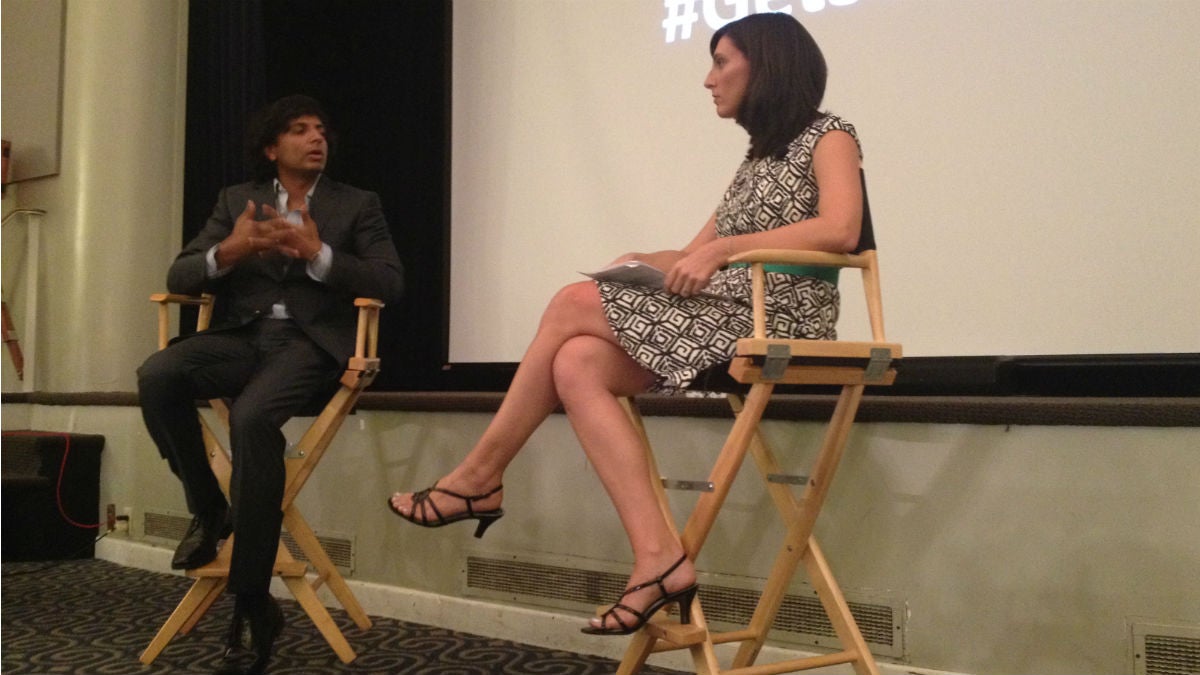M. Night Shyamalan talks education in Delaware, really

M. Night Shyamalan (left) talks education with Delaware teacher of the year Megan Szabo. (Avi Wolfman-Arent, NewsWorks/WHYY)
The acclaimed director says he’s got the formula to close America’s achievement gap.
He has directed, produced, and written some of his generation’s most frightening films. On Friday night, though, M. Night Shyamalan stepped into perhaps the scariest role of his career, that of mediator in the increasingly acrimonious debate over public education.
The Philadelphia-bred director appeared at Theatre N in downtown Wilmington to discuss his five prescriptions for closing the achievement gap, the same five he laid out in a 2013 book titled “I Got Schooled.” He delivered that message with an eye toward conciliation, emphasizing that all parties in the ongoing education wars—teacher’s unions, charter schools, ed reformers—have good intentions and at least some good ideas. Just not a monopoly on good ideas.
“There are no villains in this,” Shyamalan said before a crowd of about 100. “Everybody’s trying hard. They’re just trying and failing.”
Shyamalan, however, believes he has the winning formula. In his book, he lays out five principles for fixing the 17 percent of failing schools that he says have created the learning gap between rich students and their low-income peers. They are No Roadblock Teachers, The Right Balance of Leadership, Feedback, Smaller Schools, and More Time in School.
No Roadblock Teachers refers to removing or reforming the bottom five percent or so of teachers, who, according to Shyamalan, have an outsized and deleterious effect on students in high-poverty schools. The Right Balance of Leadership is about establishing a consistent culture and freeing principals from bureaucratic distractions. The Feedback portion touches on the use of classroom data, and why teachers should consistently monitor their students’ progress. Smaller Schools and More Time in School are, well, self-explanatory.
Less self-explanatory is Shyamalan’s interest in education policy. It began when he was scouting movie locations in 2007 and visited two vastly different public high schools in his native Philadelphia. The disparity pained him, and jump-started a five-year odyssey through the dense forest of education research. His goal: to find a set of remedies that could work in tandem to eliminate the achievement gap.
On Friday, Shyamalan detailed the rationale behind those principles in a peppy, entertaining conversation with Delaware teacher of the year Megan Szabo. He also emphasized that his principles were not the product of opinion, but rather were supported by rigorous and consistent academic findings.
“This is what the data says,” Shyamalan repeated throughout the evening, like a mantra.
He urged a more research-driven approach to education policy, likening it to medical science.
“I don’t want your opinion if you’re going to give me heart surgery,” Shyamalan said, implying that opinion-based remedies for public schools would have similarly disastrous results.
The director received a warm reception, particularly in his defense of teachers—whom he called, based on research, of course, some of the most “selfless” professionals in the world.
The enthusiastic reaction, however, was evidence of the very thing Shyamalan wants to curb. The education world is divided along a series of emotionally-charged fault lines—between teachers and reformers and parents. Each party has a large stake in the outcome, which makes it difficult to act with sobriety.
“It’s hard for us to be clinical about it,” Shyamalan said.
Friday’s event was hosted by DelaCORE Leaders, a nascent coalition of education leaders in the Wilmington area. The group plans to host similar, salon-style events in the future with hopes of building a more civil and collaborative dialogue on the state’s education needs.
WHYY is your source for fact-based, in-depth journalism and information. As a nonprofit organization, we rely on financial support from readers like you. Please give today.


